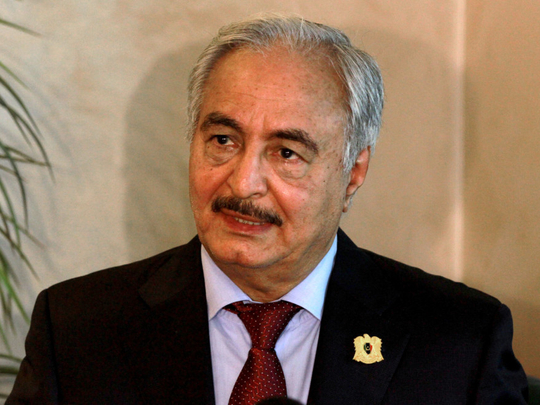
Cairo: The UN Envoy to Libya says changes to the country’s peace deal are possible after the internationally recognised parliament rejected one article of the agreement, which would strip a powerful army chief of his post.
In a press conference Wednesday, Martin Kobler said there was a “mechanism” within the Libya Political Agreement for amendments to be made, in apparent contradiction to earlier warnings against making changes to a deal that capped months of difficult negotiations.
On Monday, Libya’s House of Representatives also voted against the unity government proposed under the peace deal, giving rivals ten days to come up with a new, smaller cabinet.
Libya has been split into two parliaments since 2014 with the internationally recognised HoR convened in the east and an Islamist-dominated parliament sitting in the west.
World powers have urged Libya’s warring factions to endorse the unity government formed last week under a UN-brokered deal aimed at ending political paralysis that has fuelled the rise of terrorists.
On Tuesday, European sources said the 28-member European Union was considering sanctions against those seen as “spoiling” efforts to forge a unity government.
An asset freeze and a travel ban could be imposed on leaders of the heads of the Tripoli-based parliament and government as well as on Aguila Saleh, who heads the internationally recognised legislature.
That parliament, based in eastern Libya, on Monday voted against supporting the proposed 32-minister cabinet headed by businessman Fayez Al Sarraj.
Al Sarraj will present a new “more restrained” unity government for approval by the recognised parliament, said Fathi Bin Eisa, adviser to the unity government.
“We will respect the deadline of 10 days,” he added.
Lawmakers criticised the government as too large and also objected to an article in the UN-brokered accord giving the cabinet the power to approve top security and military positions.
Shrinking the cabinet complicates the task of accommodating the demands of the country’s multiple political groups and militias.
Several countries, including the United States and European nations such as Italy and France, are ready to provide military aid to help fight terrorists but want to see a unity government established first.
Parliamentarian Fahmi Tuwaty said many lawmakers oppose the deal because of the article on approving top security and military positions which they fear will lead to army chief Khalifa Haftar losing his post.
“The committee tasked with representing parliament in the UN-sponsored talks will be dissolved and a new team will be appointed on Monday to negotiate the removal” of the clause, said lawmaker Saltana Al Mismari.
Haftar launched an offensive against Islamists in eastern Libya in May 2014, prompting the then-government to accuse him of trying to stage a coup.
But after Islamists seized Tripoli soon afterwards, forcing parliament to flee to the country’s far east, the internationally recognised authorities gradually allied themselves with a figure previously seen as a rogue general.
He was named head of the Libyan army loyal to the recognised parliament in March 2015.
The sidelining of Haftar is one of the conditions set by the Tripoli-based General National Congress.












